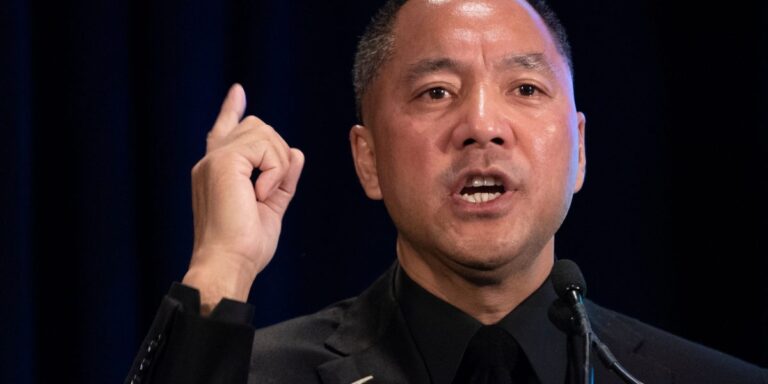
Exiled Chinese tycoon Guo Wengui, whose crusade against the Communist Party attracted allies including Donald Trump associate Steve Bannon, has been convicted of defrauding investors of $1 billion to fund his lavish lifestyle.
After a nearly two-month trial in Manhattan, Guo was convicted Tuesday of fraud and racketeering conspiracy. Found guilty on nine of the 12 counts against him, he faces up to 20 years in prison on the most serious charges when he is sentenced on Nov. 19.
Guo “brazenly implemented multiple, interrelated fraudulent schemes, all designed to defraud his loyal followers of their hard-earned money so that Guo could spend his days in his 50,000-square-foot mansion, driving his $1 million Lamborghini, or lounging on his $37 million yacht,” Manhattan U.S. Attorney Damian Williams said in a statement after the verdict.
A lawyer for Guo declined to comment, but it is almost certain that Guo will appeal the verdict.
Guo smiled at his lawyers as the jury filed out, hugged attorney Sabrina Shroff and shook hands with other members of the defense team. The outspoken businessman, also known as Ho Wan Kwok or Miles Guo, was tried before jurors whose names were kept secret — an unusual move intended to protect them in a case that has generated intense interest.
Guo managed to attract a large online fan base and raised money from investors for seemingly legitimate businesses, but diverted those funds to spend on himself and his family. The trial involved weeks of testimony from investors attracted to Guo because of his public criticism of the Chinese Communist Party, as well as luxury car dealers who sold him rare vehicles and a managing director of Kyle Bass’s Hayman Capital Management hedge fund, which ran a hedge fund in which the government said Guo invested $100 million of the stolen funds.
Neither Bass, Hayman nor Bannon have been accused of wrongdoing in the case.
Videos of his superyacht
Guo built his social media following through videos recorded from his penthouse at the Sherry-Netherland Hotel overlooking New York’s Central Park or from the deck of his 150-foot superyacht. Guo claimed his fortune came from his wealthy family of real estate developers in China. But some of his wealth, federal prosecutors say, also came from stealing $1 billion through fake investment opportunities he peddled online.
The jury began deliberations Thursday but was forced to start over with an alternate juror after a panel member admitted to Googling the name of a co-defendant who remains at large.
The defense urged jurors not to let Guo’s expensive tastes cloud their judgment, saying he was flaunting his wealth as a protest against the Communist Party.
The prosecution had its own analysis. “Is Miles Guo a genuine political activist?” Assistant District Attorney Juliana Murray said Thursday during closing arguments. “I don’t know and I don’t care because that’s not what this trial is about.”
Mysterious background
The case explored Guo’s mysterious background, including his escape from persecution in China, his ties to Bannon and how he came to invest millions in Hayman Capital’s high-risk bet against the Hong Kong dollar.
Bannon was on Guo’s yacht off the coast of Connecticut in 2020 when the political adviser was arrested on charges he conspired to embezzle hundreds of thousands of dollars from a campaign to fund a wall on the southern U.S. border. Trump pardoned Bannon just before leaving office.
In 2020, Guo transferred $100 million raised through an illicit stock offering of his GTV Media Group to the Hayman Hong Kong Opportunities Fund, which believed the country’s currency peg to the U.S. dollar would collapse, prosecutors said. Bannon introduced Guo and Bass, a longtime China skeptic. Bannon himself was paid $1 million as a consultant to GTV’s parent company, Saraca Media Group, evidence presented at trial showed.
After Hayman received the investment, Bannon emailed Bass.
“Congratulations on the Miles deal”
“Congratulations on the miles deal,” Bannon wrote, according to an email submitted as evidence. “He thinks you’re the biggest superstar in finance.”
A month later, the U.S. Securities and Exchange Commission contacted Hayman to inquire about the source of the funds. When Bass asked Guo’s financial adviser for an explanation, he received no response, evidence shows. By that point, nearly $30 million had been lost in the failed monetary gamble.
The remaining $70 million was eventually returned to authorities.
Guo was acquitted Tuesday of fraud related to the GTV stock offering and illegal currency transaction charges related to the transfer of $100 million to the Hayman hedge fund.
$539 Million Settlement with SEC
In 2021, three companies linked to Guo, including GTV, agreed to pay $539 million to settle SEC investigation into unregistered stock offerings.
Other scams by Guo, prosecutors say, involved an exclusive members-only private club with a minimum buy-in of $10,000, a crypto platform called Himalaya Exchange and an agricultural loan program.
The government accused Guo of also embezzling investor funds to buy luxury goods, including a red Lamborghini, a $4 million Ferrari for his son and a $26 million mansion in New Jersey.
The case is: United States v. Guo, 23-cr-00118, United States District Court, Southern District of New York (Manhattan).


